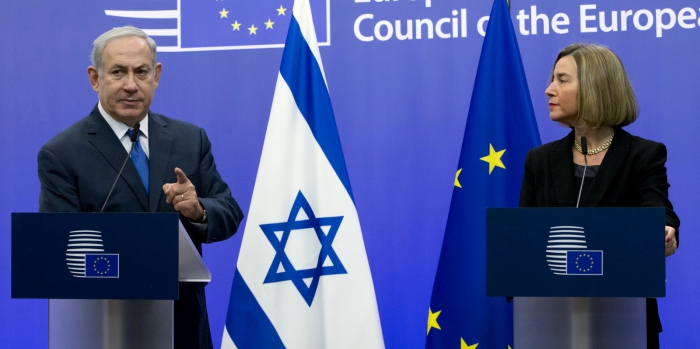Note d’actualité
Avec la reconnaissance de Jérusalem comme capitale d’Israël et la décision d’y transférer l’ambassade US, le président Trump a fait un premier pas pour briser l’un des réflexes les mieux ancrés des Européens. Car, comme l’avait remarqué l’ancien commissaire européen Chris Patten, sur le dossier proche-oriental en particulier « le principal déterminant du comportement politique de l'Europe » a été jusqu’ici « le refus pavlovien de toute ligne de conduite qui pourrait éloigner l'Europe des Américains ».
Toujours est-il que, si le suivisme mécanique ne s’est pas produit cette fois-ci, les principales puissances européennes désapprouvant la décision US, l’Union européenne est loin de présenter un front uni. L’Europe est divisée, comme à presque chaque fois où l’alignement commun sur le grand allié n’est pas possible. A ceci près que l’administration Trump a considérablement changé la donne, et Jérusalem n’est que le premier d’une série de défis en provenance d’outre-Atlantique qui se profilent à l’horizon.
L’Europe prend ses distances
Une fois n’est pas coutume, sur la question de Jérusalem, la France, l’Allemagne et le Royaume-Uni ont tous les trois fait part de leur désaccord par rapport à la relocalisation de l’ambassade des Etats-Unis. Ils ont tous les trois soutenu la résolution de l’Assemblée générale des Nations Unies qui « déplore au plus haut point » les décisions américaines relatives à Jérusalem et juge qu’elles sont « nulles et non avenues » du point de vue juridique. Paris, Berlin et Londres ont également été unanimes à boycotter le gala d’ouverture de l’ambassade US relocalisée. Le chef de la diplomatie européenne, Federica Mogherini, a quant à elle exprimé sa « sérieuse préoccupation » face à l’annonce américaine. Elle n’a également eu de cesse de répéter que « la position de l’UE reste inchangée ».

(Crédit photo: AP/Virginia Mayo)
Cette position commune se limite, par définition, à l’appel au respect du droit international. Ainsi, « L’UE reste fermement engage à continuer de travailler avec les deux parties et avec ses partenaires dans la communauté internationale en vue de la reprise de véritables négociations avec l’objectif d’arriver à la solution des deux Etats, et Jérusalem capitale des deux ». Ceci implique également, comme elle tient à le souligner, le respect du consensus international tel qu’il s’incarne dans la Résolution 478 du Conseil de sécurité des Nations Unies, appelant au retrait de toute représentation diplomatique de Jérusalem. A cette approche légaliste viennent s’additionner en Europe d’autres considérations, plus politiques. Tel le souci d’enrayer l’escalade de la violence dans son voisinage immédiat, de même que d’éviter les provocations inutiles susceptibles de radicaliser ses propres minorités musulmanes.
De surcroît, les Européens se sentent souvent inconfortables avec certaines caractéristiques de la prise de décision US qui leur paraissent comme faisant partie d’un même schéma. Ils n’apprécient pas d’être mis devant le fait accompli international par le président américain pour des raisons qu’ils estiment être en grande partie d’ordre électoral. Etroitement lié à cela, il existe une forte réticence en Europe vis-à-vis de ce qu’ils voient comme la contamination du discours politique par le fait religieux, la réduction des problèmes complexes à une simple opposition entre le Bien et le Mal. De même, les Européens se méfient de l’option unilatérale, a fortiori sous une forme brutale, qu’ils considèrent à la fois comme source de ressentiments, donc d’instabilité future et, dans un monde de plus en plus multipolaire, comme un précédent dangereux.
L’Europe se divise, pour les mêmes raisons que d’habitude
Malgré cette large convergence des considérations juridiques, politiques et stratégiques, les 28 Etats membres de l’UE n’ont pas été capables de publier ne serait-ce qu’une seule déclaration commune. La première, dès l’annonce du président Trump a été bloquée par la Hongrie, et la seconde, à la veille du transfert de l’ambassade US a été opposée par la Hongrie, La République tchèque et la Roumanie. Entretemps, l’Union européenne n’a pas pu soutenir en tant que telle la résolution de l’Assemblée générale de l’ONU déplorant la décision US, du fait de l’abstention de six de ses Etats membres (les trois ci-dessus rejoints par la Pologne, la Lettonie et la Croatie). Pour terminer, si 24 pays européens ont boycotté la soirée de gala organisée pour l’ouverture de l’ambassade US, quatre s’y sont rendus (la Hongrie, la Roumanie, la République tchèque et l’Autriche).
Il y a fort à parier que ce n’est pas un soudain accès d’illumination sur les complexités du processus de paix israélo-palestinien qui aurait amené les pays d’Europe centrale et orientale à prendre le contre-pied de la majorité de leurs partenaires européens. Tout comme lors de la division en « vieille Europe » et « nouvelle Europe » au sujet de l’intervention américaine de 2003 en Irak, quoique dans une proportion bien moindre cette fois-ci, certains Etats membres préfèrent se démarquer de la solidarité européenne s’ils l’estiment aller à l’encontre de la loyauté atlantiste.
Dans ces conditions, la position commune de l’UE, exprimée par sa Haute représentante Mogherini, est réduite au plus petit dénominateur commun qu’est le respect du droit et du consensus international. Toutefois, même avec cette approche minimaliste, l’équilibre fragile à 28 risque d’être mise à mal, sur deux points. Premièrement, il ne s’agit que d’une pause momentanée qui ne durera que jusqu’à la présentation du plan de paix américain. Comme l’a dit le ministre français des Affaires étrangères « dès lors qu'un plan est en préparation, il serait malvenu pour la France ou l'Union européenne de décider d'une initiative unilatérale ». Par contre, si le plan américain n'est pas jugé par tous comme suffisamment équilibré, le projet d’un accord d’association UE-Palestine ou la question de la reconnaissance de l'Etat palestinien pourraient se retrouver en tête de l’agenda. D’ici là, l’Union sera occupée à maintenir tous les Etats membres dans le rang, qu’il s’agisse du non-transfert des ambassades (la République tchèque hésite, paraît-il) ou de la mise en œuvre parfois difficile de la distinction de principe entre territoire israélien et territoires occupés.
Au-delà de Jérusalem : d’autres épreuves transatlantiques en vue
Au lendemain de la crise irakienne, la directrice de l’Institut de l’UE pour les Etudes de sécurité a mis en exergue l’un des obstacles les plus persistants à une politique étrangère européenne : « Il est beaucoup plus facile aux Européens de s'entendre sur l'analyse des crises extérieures que sur l'analyse de la politique américaine. Autrement dit, le monde rassemble, l'Amérique divise. Si les Européens parviennent assez facilement à une vision à peu près commune du monde, ils se divisent en revanche sur le rôle de l'Union dans la gestion des crises. Parce que ce rôle est en effet largement fonction du type de relations que chacun souhaite construire avec la puissance américaine, à titre bilatéral ou au sein de l'OTAN ». En d’autres termes, du moment où l’alignement collectif pur et simple n’est pas une option, le positionnement des uns et des autres se fait, en premier lieu, en fonction de son impact sur les relations transatlantiques. Assument-ils de se démarquer de leur plus grand allié ou, au contraire, estiment-ils que l’essentiel est de faire preuve de loyauté vis-à-vis des Etats-Unis ?
Ce dilemme perpétuel apparaît aujourd’hui dans un contexte bien particulier. Au-delà de la question de Jérusalem, deux sujets éminemment chers au cœur, et au portefeuille, des Européens sont en suspense : les tarifs douaniers et l’accord nucléaire avec l’Iran. Ajoutez à cela le style extrêmement « franc » du président Trump, et une opinion publique européenne de plus en plus eurosceptique qui risque de s’aliéner encore plus si elle ne voit qu’une Union dépendante et impuissante. Il s’agit d’un mélange explosif, où les réflexes européens d’alignement et de concessions disproportionnées pourraient avoir plus de mal que d'habitude à l’emporter.
De ce point de vue, peu importe qui « a raison » ou quelle politique serait « la bonne » sur tel ou tel dossier. Sur Jérusalem, l’Iran, les tarifs douaniers – il peut y avoir des arguments valables des deux côtés. L’essentiel ici est de savoir s’il y a une quelconque utilité pour les Européens d’essayer de défendre collectivement leurs intérêts, voire de définir, ne sait-on jamais, une politique. Ou ces efforts sont-ils d’emblée voués à l’échec, dès que le dossier en question implique, de près ou de loin, les Etats-Unis. Grâce à la propension du président Trump à soulever les sujets les plus sensibles, sans ménagement et à un rythme accéléré, les premiers éléments de réponse tangibles ne sauraient tarder.
Ce texte est la version française de l'article original: Hajnalka Vincze, Jerusalem: President Trump Challenges Europe’s “Pavlovian” Reflexes, In The American Review of Books, Blogs, and Bull, Foreign Policy Research Institute (FPRI), 18 May 2018.
Tags:
relations transatlantiques, ue




















